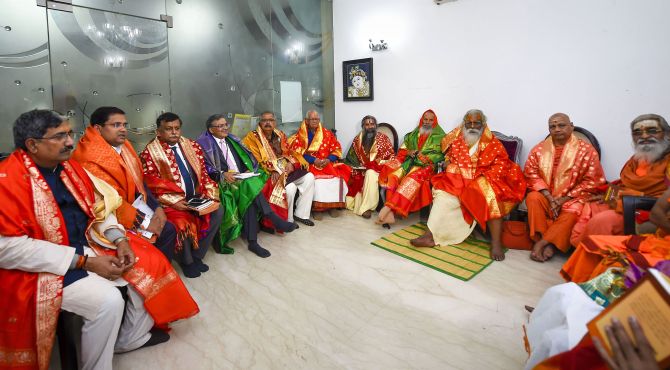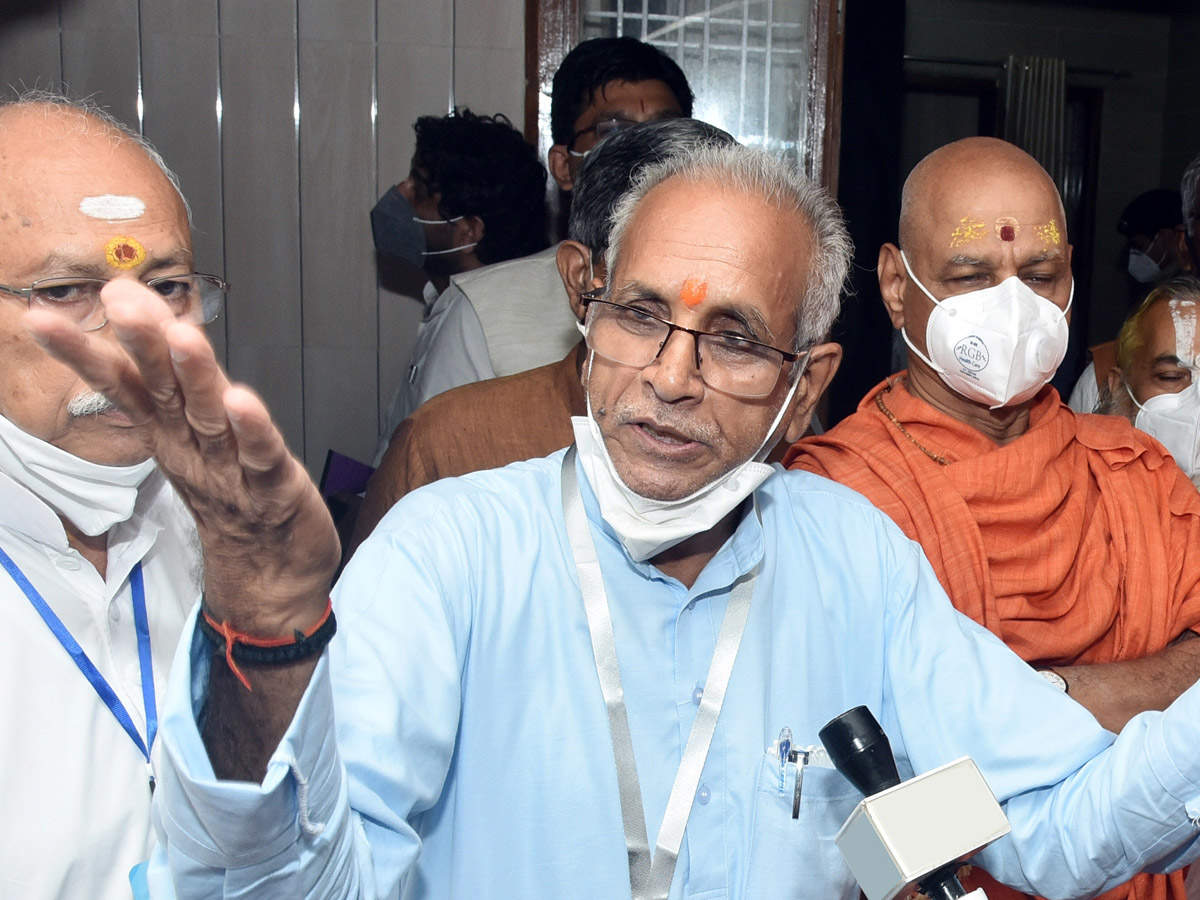Ramdev made his billion-dollar fortune by promoting Indian identity through consumer products and his followers’ beliefs.
Swami Nityanand is said to have acquired a fortune of $1 billion after fleeing the country when he was accused of raping a disciple.
He dubbed his island ‘Kailaasa,’ a Hindu kingdom with its own flag, passport, and insignia.
Asaram Bapu- in jail for raping a minor girl had amassed a fortune of $134 million.
According to the FBI, it is investigating 2 billion dollar affinity frauds in the predominately religious state of Utah alone.
Affinity scams are so effective because they capitalize on the same emotion that drives us to religion.
When it comes to the gods, we live in a culture where there is little responsibility. In the guise of faith, godmen become more powerful than government, and all dissent is silenced.
The purpose is not to blame houses of following worship but to draw attention to the lack of transparency, even the holiest of places may be tainted when greed infiltrates.

So, what do we make of the alleged financial scam involving the Shri Ram Janmbhoomi Teerth Kshetra Ram Mandir Trust?
The Indian government established a trust for the construction and management of the Shri Ram temple in Ayodhya.
The trust has 15 members in total. Following the supreme court’s decision, the trust was handed the disputed 2.77 acres of land as well as the 67.703 acres of the disputed property.
Champat Rai is the trust’s general secretary, while Mahant Nityagopal Das Maharaj sits on the president’s chair.
The Indian government nominated 12 members out of 15.
The Centre further mandated that all members of the Trust must be devout practicing Hindus, with at least one belonging to the Scheduled Caste category.
Timeline of the Fundraiser
The fundraising campaign began in January 2020 and was intended to last 45 days.
Mar 5, 2020- The current account of the trust was opened in SBI and Rs 10 core was transferred from the trust’s previous bank account.
May 8, 2020- Donations to the temple were classified under section 80G of the tax code, making them eligible for tax deductions.
28 Dec 2020 – In an official statement by Shri Ram Janmbhoomi Teerth Kshetra, The building of Ram Mandir was initially budgeted at Rs 1100 crore.
13 Feb 2021 – A total of Rs 1511 crore has been raised as a result of the campaign.
28 Feb 2021 – The fundraiser was a success, according to Trust, with Rs 2100 crore collected.
7 April 2021- Donations did not stop and the trust reported Rs 5457 crore as the final tally, which is over four times the original sum planned.
In addition, 400 kg of silver bricks overflowed the trust’s coffers, forcing it to publish a statement requesting devotees to stop contributing silver bricks since they were running out of room to properly store them.
The Trust has accounts in SBI, PNB, and BOB. Donations are still being received, and the drive is still ongoing, according to the official statement, since devotees don’t want to lose out on the chance to help build Ram Mandir.
Where did the money go?
4 march 2021- Trust acquired 7285 sq-feet lands for Rs 1 crore at the rate of RS 1375/ sq-feet.
20 march 2021- Another major acquisition worth Rs 8 crore for 1.15 lakh sq at the rate of Rs 650/sq-feet, was disclosed.
VHP leaders say that Indian multinational technology, engineering, building, and manufacturing business Larson & Turbo volunteered to build the Ram Mandir for free-according to a New Indian Express report by Namita Bajpai.
So here is the alleged scam. Sultan Ansari bought land valued at Rs 5.7 crores from Kusum Pathak for Rs 2 crores. Then Ram Mandir Trust bought the same land from Ansari five minutes after he bought it from Kusum for Rs 18.5 crores. @rohini_sgh pic.twitter.com/qimKs6JDTC
— 🇮🇳 Bhanwar Singh Rajpurohit 🇮🇳 (@SoldierGdrs) June 13, 2021
All of these aspects when looked through a single lends, beg the question- what will happen to the excess money that is 4 times the original target?
On Monday, Samajwadi Party (SP) and Arvind Kejriwal‘s Aam Aadmi Party (AAP) accused the Ram Janmbhoomi Teerth Kshetra Trust of land fraud, alleging that the price of property rose from Rs 2 crore to Rs 18.5 crore per piece in only 10 minutes.
Champat Rai, the trust’s general secretary, released a statement in Hindi, claiming that all land transactions associated with the Shri Ram Janmbhoomi Teerth Kshetra were transparent.
Sanjay Singh, the leader of the AAP, shared various papers on social media and stated that “Ravi Mohan Tiwari and Sultan Ansari bought land worth Rs 2 crore at 7.10 pm. At 7.15 pm, Champat Rai of Ram Janmbhoomi Trust bought this land from them for Rs 18.5 crore.

Out of this Rs 18.5 crore, Rs 17 crore was paid through RTGS. This means, there has been an increase of Rs 5.5 lakh every second. Is there any place in the world where land prices change so quickly? But this happens at Lord Ram’s birthplace,” according to the Hindustan Times, he said.
Anil Mishra, member of the Ram temple trust and the witness on both times during the selling and buying of field. #RamMandirScam
https://t.co/BvsKbC4Nra— AAP Ideology (@AapIdeology) June 13, 2021
The Daunting Accusation
In the holy and sacred name of Ram Mandir, Shri Ram Janmbhoomi Teerth Kshetra is accused of money laundering.
Ram Devotees throughout the world are skeptical that the trust is abusing their faith to set up a flawless money-laundering mechanism in India.
The land deed was witnessed by two people: Dr. Anil Mishra, a trusted member, and Shrikesh Upadhaya, the hardline Hindutva mayor of Ayodhya.
Normally, the two brokers, Sultan Ansari and Ravi Mohan Tiwari would be held guilty for the financial fraud, but if sources are to be believed, the two brokers, along with mayor Upadhayay, are property dealers, and the mayor and Ravi Mohan Tiwari are related.
In a classic money-laundering scheme, organizations take tax-free donations and use crooked brokers to acquire assets at a lower cost, and then the brokers sell the assets to the organization at a higher cost.

The organization and the brokers are different businesses on paper but behind closed doors, the brokers are cleaning the cash through cost inflations and the organization keeps the extra amount.
After dispersing the agreed-upon cut, the organization gives the cleaned sum to the original donors, completing the cycle.
Greed infiltrates and even the holiest places may become the perfect money-laundering system when an organization is so heavily shielded by the government of the country and is immune to any scrutiny or transparency.
Accusations arise when there a general lack of transparency, Champat Rai -General Secretary of the trust said on Monday that “Allegations (of fraud) are misleading and motivated by political hatred.

All lands that Shri Ram Janmbhoomi Teerth Kshetra has purchased so far have been bought at a price much less than the open market price.”
We request that Mr. Rai put an end to the false allegations and make the trust’s financial operations more transparent.
It isn’t much to ask, given that the Shri Ram Janmbhoomi Teerth Kshetra is connected with the faith of millions of Lord Ram followers.
Also Read:
Ram Bhoomi Trust Accused Of Land Scam And Money Laundering : “2 Crore To 18 Crore In Minutes”












